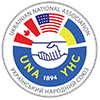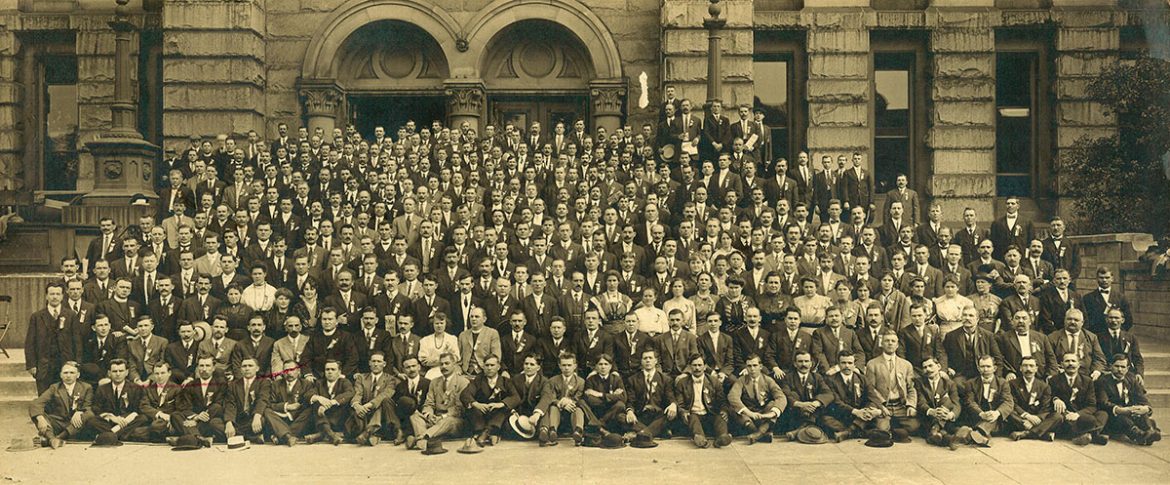
by UNA | Feb 22, 2019 | Announcements

13-та Конвенція УНСоюзу. Бафало, Ню-Йорк, 7-10 вересня 1914 року.
Уривок зі статті ,, УНСоюз вчора, сьогодні і завтра” з Альманаху Українського Народного Союзу за 1984 рік.
В Україні не було організацій типу братських союзів в Америці. Тому ми знали про існування Українського Народного Союзу, але мали дуже слабке уявлення про нього. Пригадаймо, що коли нахлинула до Америки хвиля українських іміґрантів після Другої світової війни, то довгий час нові українські мешканці нюйоркського „давнтавну“ вважали, що таким самим є ціле місто Ню-Иорк. І скільки років треба було, щоб українські поселенці в Америці усвідомили, що Ню-Йорк не є цілою Америкою, та скільки років треба було, щоб взагалі пізнати Америку як країну не тільки різнорідну своєю географією і виглядом окремих стейтів, але і як країну контрастів, у яких трудно визнаватися.
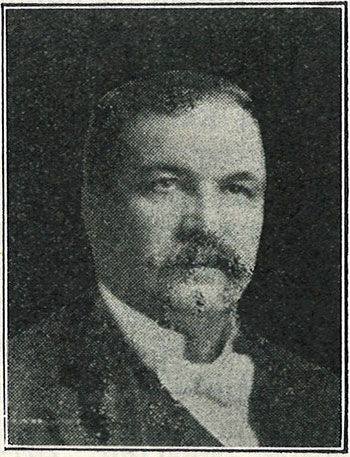
Теодосій Талпаш – перший предсідник УНСоюзу.
І тому нам, українським людям у „старому краю“, навіть трохи смішно було чути, що Український Народний Союз наші земляки в Америці називають „Батьком Союзом“. Ми не орієнтувалися і не знали, що від часу заснування Союзу 90 років тому насправді аж до вибуху Другої світової війни у 1939 році був УНСоюз для американсько-української громади „батьком“.
На цю почесну назву справедливо заслужив собі, опікуючись громадою буквально в усіх ділянках її життя. (…)
УНСоюз займався обороною молодої української держави на рідних землях. УНСоюз дав ініціятиву до створення Української Народної Ради, яка перетворилася у „Федерацію українців у З’єдинених Державах“. (…) УНСоюз ніколи не втрачав з очей України і тому його пожертви йшли на Рідну Школу в Західній Україні і на Фонд голодуючих, на Фонд Визволення України, на Фонд Січових Стрільців, — на всі ті установи й організації в Україні, які потребували матеріяльної допомоги. (…)
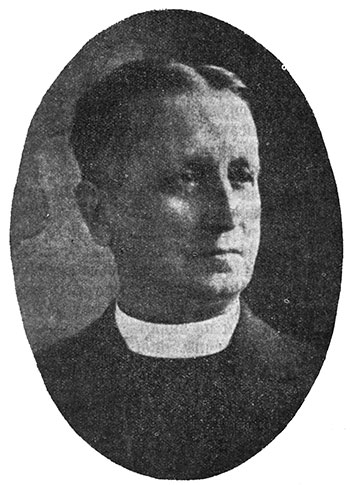
о. Іван Констанкевич – перший головний секретар УНСоюзу.
Коли трагічний для України кінець Другої світової війни викинув на північно-американський континент кругло 100 тис. нових іміґрантів, діяпазон діяльности УНСоюзу мусів природно звузитися. Заснування цілої широкої мережі окремих організацій з усіх ділянок життя громади перебрало від УНСоюзу різні його попередні журби. Але не цілком. Візьмім, наприклад, науковий сектор.
Наукове Товариство ім. Шевченка, Українська Вільна Академія Наук і Шкільна Рада УККА – це дуже неповний список існуючих в Америці клітин наукового світу. Постав Український Науковий Інститут при Гарвардському Університеті, існує окреме Історичне Товариство, існують різні видавництва, організації й установи. Але саме УНСоюз видав своїм трудом і фінансами двотомову англомовну Енциклопедію Українознавства й вичерпний однотомовий англомовний твір „Історія України-Руси“ Михайла Грушевського.
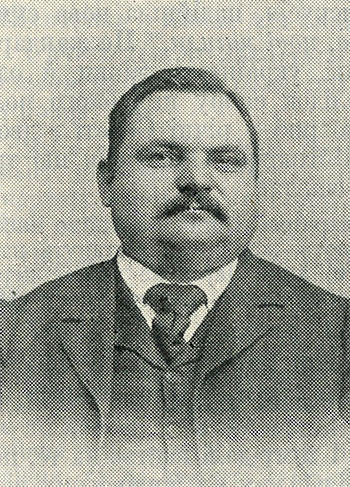
Івна Ґлова – перший головний касир УНСоюзу.
Немає другої установи ані організації в „американській Україні“, яка рівнялася б числом свого членства, своєю повагою, своїм авторитетом і своїми заслугами у минулому з Українським Народним Союзом. У великій мірі спричиняється до цього факт, що УНСоюз видає „Свободу“ й англомовний „Український Тижневик“. „Свобода“ була і є провідним керівним українським часописом у всьому українському вільному світі.
by UNA | Feb 22, 2019 | Announcements
Reprinted below are excerpts of the Svoboda editorial of November 1, 1893, which called for the establishment of a fraternal organization for Ukrainians in the United States. The front-page editorial was titled “We need a national organization.” (At that time, Ukrainians were known as Ruthenians, and the original Ukrainian text of the editorial referred to “Rusyny.” In the translation below, which is reprinted from “Ukrainian National Association: Its Past and Present,” the 70th anniversary history of the UNA written by Anthony Dragan, the term “Ruthenian” has been replaced by “Ukrainian.”)
…we promised that we would explain how we, Ukrainians, living here in freedom, can improve our lot and show our neighbors that the Ukrainian people are also part of America and occupy a place of honor among all other peoples. …
Just as the fish needs water, as the bird must have wings, as the thirsty need to drink and the hungry need bread, just as every one of us needs air, so do we all Ukrainians scattered across this land need a national organization, namely such a brotherhood, such a national union that would embrace each and every Ukrainian no matter where he lives. One man cannot lift a heavy stone, but when three or four men put their strength to it, the stone will soon be lifted, it is just as difficult for one man to rid himself of want and poverty, but with the help of a few he can do it. One man cannot help all, but all can easily help the man.
It is clear then that in unity there is strength, and it is not easily defeated. Therefore, let us unite brothers, voluntary exiles from our native land, our fatherland, let us come closer together and get to know each other better, and take a closer look at our poverty, our want, our shortcomings, our needs. Let us exchange ideas, let us open our hearts to each other and see how we can solve, our problems together, and rid ourselves of our common ills!
…we Ukrainians always seem to be behind in everything. We have nothing and we are treated as nothing. Come now, brothers, let’s wake up, let us get to work. Let us look how others have reaped such good harvests, while we do not even know where to buy a sickle. Let us finally rid ourselves of this passive slumber, this negligence and indifference, let us stop saying “oh, leave things as they are,” let us follow the example of others and show that we too are strong and that we can take care of ourselves. There are many of us here now – hundreds of thousands of Ukrainians from both sides of the green Carpathian Mountains.
After long deliberations, dear brothers, on the needs of the Ukrainian American people, we have come to the conclusion that we should share with you an idea born within our soul out of deep love and concern for the Ukrainian people. If this idea, this thought becomes a reality, the future generations born in this land of the free will thank us and remember us kindly and adorn our graves with flowers nursed by tears of joy and gratitude. Calling on Almighty God to bless this seed which we throw into the Ukrainian tillage, we wish to inform the Ukrainian worker toiling hard either in dark mines or in factories where death lurks behind thousands of wheels, that it is imperative to create a national organization in America known as the Ukrainian National Association which would be open to the Ukrainian workers only, financed by their moneys to assist needy fellow workers, controlled and governed by the workers, who would thus maintain and administer their own funds.
The aims of the Ukrainian National Association would be as follows:
• to help the ailing and to pay benefits after death;
• to establish reading rooms and evening schools for adults;
• to promote enlightenment among our people with the help of inexpensive publications, as it is being done in the old country;
• to insist that Ukrainians become American citizens;
• to organize political clubs and to take an active part in the elections;
• to defend our people against sharks, crooks and operators.
To ensure successful development of the Ukrainian National Association, it will be necessary to purchase a home in a city that would be found most appropriate, and to name it the Ukrainian National Home. …
A new Ukrainian generation is rapidly growing up here in America, but who is to provide a good future for the Ukrainian youth? What will happen if this youth grows up without knowledge of the Ukrainian language, Ukrainian history and Ukrainian religion?
It would be the responsibility of the Ukrainian National Association to find out how many Ukrainian children of school age there are in various cities, and whether the people themselves can maintain a teacher or if outside help is needed.
We are certain that this idea, this plan of ours will be welcomed by Ukrainians in all America, although we expect to find many who will think that all of this is quite unnecessary.
Come what may, we are bravely calling on the Ukrainian people: Have faith in our idea! We swear to God Almighty that our sole concern is the good of the people. Wake up and see who is your brother and who wishes you well. You have eyes, look at what is happening around you, how you are being abused and ignored, and how only your work, bathed in sweat and blood, is appreciated by those who care solely for their own pockets. They get rich on your ignorance, stupidity and helplessness while you, poor man, rot deep in the mine or, like an ox, pull trucks in the factory, slaving for everybody but yourself… But when you become ill and die in pain, your friends must beg for money among your own people so that your sinful body is not thrown to the dogs but is buried in a Christian way with a cross on your grave, humbly awaiting the day of resurrection.
We firmly hope and believe that our call will not be the voice of one crying in the wilderness and that our dear Ukrainian friends will raise their own voices and write to us.
If our fellow Ukrainians fail to respond to our call and if they neglect this important and burning matter, they will have given a sad account of their spiritual maturity and determination. But we do not believe that, for our people will raise their mighty voice and Ukrainians everywhere will say: We need the Ukrainian National Association, we must get to know each other better, we must unite, we must work together to improve our lot in this new land!
by UNA | Feb 22, 2019 | Announcements
The editorial below was published in the February 20, 1994, issue of The Ukrainian Weekly, which was dedicated to the centennial of the Ukrainian National Association.
One hundred years ago, 10 brotherhoods, having assets totaling $220 and a total membership of 439, resolved to form the Ukrainian National Association (then known as the Ruskyi Narodnyi Soyuz). They acted on the suggestion of a historic editorial that appeared in Svoboda on November 1, 1893: “Ukrainians scattered across this land need a national organization, namely such a brotherhood, such a national union that would embrace each and every Ukrainian no matter where he lives. …in unity there is strength, and it is not easily defeated….”
On February 22, 1894, the word became deed. The Ruthenian National Association was established, “it has come to be,” proclaimed Svoboda. The newspaper editorialized: “Dear brothers, now that a great number of us have gotten together and founded the association, let us all join it. … You, who had been given up for lost by your brothers in Ukraine, let the world know that you are alive, and that here, in America, the life of the Ukrainian community is throbbing with vigor and activity. …The Ukrainian National Association has been founded, and the Ukrainian people in America have risen from the dead…”
And so it was, the Ukrainian community in North America grew and prospered, as did the Ukrainian National Association. Today, at 100 years of age, it has assets of $72.5 million and a membership of 64,000. it has grown far, far beyond what it was at the time of its founding. But one thing has remained constant: its devotion to its founding principles. Throughout its history, the UNA has always extended a helping hand to its members, the Ukrainian community in the United States and Canada, Ukrainians wherever they have settled, and to Ukraine.
The UNA has supported countless community causes, from the erection of a monument to Taras Shevchenko in Washington and the creation of the World Congress of Free Ukrainians to the establishment of Ukrainian studies chairs and the Ukrainian Research institute at Harvard University, it has published numerous books, from Mykhailo Hrushevsky’s “History of Ukraine” to Robert Conquest’s “The Harvest of Sorrow.” It was a major donor to the work of the U.S. Commission on the Ukraine Famine as well as to the Harvard Project on the Millennium of Christianity in Ukraine.
Not to be forgotten are the UNA’s illustrious endeavors in the field of publishing (two newspapers, Svoboda and The Ukrainian Weekly, as well as the Veselka children’s magazine), its scholarships for college students in the U.S. and Canada, its roles as patron of the arts and promoter of sports, its care for the elderly, and its assistance to needy victims of natural and man-made disasters, be they in the U.S., Ukraine, or any part of the Ukrainian diaspora.
With the declaration of Ukraine’s independence, the UNA focused on helping the people of that formerly Soviet-dominated land. It created a Fund for the Rebirth of Ukraine that has supported many a project, from textbooks for the children of Ukraine to handbooks for businesspersons, and it has initiated its own educational projects, the Teaching English in Ukraine Program and the Summer institute for teachers of the English language. It also funds the Kyiv Press Bureau that is staffed, on a rotating basis, by editorial staffers of The Ukrainian Weekly – the first full-time Kyiv-based press bureau to serve a Western news outlet.
In short, the UNA has always been there for all Ukrainians. Will it continue to be there in the next 100 years? Will the Ukrainian National Association’s second century be as illustrious as its first? The future depends upon both the new generations of Ukrainians who have grown up in North America and the new wave of immigrants recently arrived on these shores from Ukraine. Will they see the value of the Ukrainian National Association, become its members and take upon themselves the organization’s leadership? That, dear readers, only time will tell.
However, we can state with all certainty that the UNA, as it marks the centennial of its humble yet profound beginnings, is moving ahead in keeping with its anniversary motto: “With reverence for the past, with a vision for the future.”
by UNA | Feb 22, 2019 | Announcements
Редакційна, 21 лютого 2014 року.
22 лютого відзначатиме своє 120-річчя Український Народний Союз – найстарша і найбільша братська, забезпеченево-допомогова організація у Північній Америці.
У 1894 році розрізнені острівці українства‚ зокрема найбільший з них – Братство свв. Кирила і Методія – злилися в Український (тоді він називався – Руський) Народний Союз. Тисячі іміґрантів з України‚ неймовірно тяжко працюючи у вугільних копальнях Пенсильванії, не мали грошей, щоб покрити видатки на похорони своїх товаришів, котрі‚ на жаль‚ нерідко гинули у шахтах. Отож початки УНСоюзу, можна сказати, лежать глибоко у вугільних шахтах Пенсильванії.
Львівський Митрополит Сильвестер Сембратович вислав до Америки о. Івана Волянського, який разом з дружиною осів у містечку Шенандоа, в Пенсильванії, де відслужив 19 грудня 1884 pоку перше богослуження, організував першу українську парохію, першу українську церкву.
У 1890 році приїхав з Галичини о. Григорій Грушка, який перший почав об’їздити українські оселі й заохочувати іміґрантів будувати свої церкви. Сам він осів у Джерзі Ситі, Ню-Джерзі, де 15 вересня 1893 року заснував газету „Свобода“, яка стала ініціятором створення УНСоюзу. Вже в перших числах газети оприлюднено потребу негайного заснування української народної організації, яка перебрала б провід у житті заробітчан. Таким чином постав 22 лютого 1894 року теперішній УНСоюз.
Сьогодні‚ оглядаючись на минуле з висоти 120 років‚ бачимо‚ що за цей час створено розгалужену і водночас чітку організаційну структуру у вигляді окремих відділів, які доступні для усієї українсько-американської та українсько-канадської громади. УНСоюз видає два тижневики, „Свободу“ і „The Ukrainian Weekly“. Створено Центр української спадщини на гірській оселі – „Союзівці“, яка стала символом української громади в діяспорі. УНСоюз надає стипендії українським студентам, допомагає Острозькій академії, здійснює інші благодійні акції.
Про професійний і громадсько-братський рівень УНСоюзу добре свідчить та обставина‚ що коли багато фінансових установ у США занепали після обвалу фондового ринку 2008 року, УНСоюз у цих дуже конкурентних, динамічних та постійно змінних умовах надійно захистив своїх членів і запевнив їхнє стабільне майбутнє.
УНСоюз безперервно розвивається‚ щоб і надалі відповідати сучасним вимогам, щоб наші діти та діти наших дітей знали й усвідомлювали історичну вартість цієї організації, котра була така важлива в побудові українсько-американської громади. „УНСоюз і громада – друзі на все життя“ – це гасло залишається дороговказом УНСоюзу.
by UNA | Feb 22, 2019 | Announcements
Редакційна, 20 лютого 2004 року.
22 лютого виповнюється 110 років від дня заснування Українського Народного Союзу. Неможливо не схвилюватися, подумавши, що ця подія сталася ще в XIX ст., бо ж тепер ми живемо вже в XXI! І не випадково вона припала саме на цей день, а не на інший: дата 22 лютого має подвійне ідейне звучання, адже це день народження першого Президента Америки Джорджа Вашінґтона, з іменем якого пов’язані засади людських прав і свобод, на котрих засноване американське суспільство. Водночас ці демократичні засади відкривали перед першими еміґрантами з України можливість об’єднати зусилля, розпочати організоване і надзвичайно важливе за змістом громадське життя, передусім в ділянці матеріяльної і духовної взаємодопомоги.
„Як є потрібна для риби вода, для птаха – крила, як спраглому – криниця, як голодному – хліб, як, нарешті, кожному треба повітря, так само і для нас, розсіяних тут українців, треба народної організації, тобто такого братства, такого всенародного товариства, до котрого кожен українець, де б він не був, де б і далеко не жив, повинен до цього братства, до цієї великої української родини, фамілії, належати”, – писав наприкінці 1893 року перший головний редактор „Свободи” о. Григорій Грушка.
І коли 1 березня 1894 року газета повідомила про установчі збори у Шамокіні 22 лютого і про їхній історичний результат – заснування української допомогово-братської організації, то цей небуденний заголовок газетної статті – „Совершишася!” – означав зматеріялізування і на вільній землі Вашінґтона найдорожчої з усіх українських ідей – ідеї загальнонаціональної і загальнохристиянської солідарности.
Потрапивши в умови свободи, наші люди не тільки перемогли всі іміґрантстькі труднощі і встояли на ногах, але при цьому виявили надзвичайно цінні прикмети – здатність до об’єднання, до взаємодопомоги, до активного культурного і духовного життя, до свідомого відповідального збереження своєї національної ідентичности, рідної культури, і водночас – до свідомого і відповідального засвоєння культури країни, котра їх прийняла. Ріст і розвиток УНСоюзу – це невпинний і послідовний ріст і розвиток нашої людини і нашої громади.
110 років діяльности УНСоюзу – це довга дорога, вимощена суспільно-корисними справами. „Єдина українська установа породила, виплекала і пустила в люди, стільки зорганізованого доробку, що його годі навіть перечислити. А тому, коли хтось із нас появлявся вперше в цьому вавилонському граді, Ню-Йорку, негайно квапився побувати за Гудзоном, сподіваючись знайти там і торкнутися власними руками тієї Мекки української – УНС… Можливо, в цілості плянетарного засягу ці три літери, УНС, займають непомітне місце, їх не знайдете у популярних енциклопедіях, але з якоїсь іншої, інтимнішої точки зору ця інституція таїть в собі великий, шляхетно-повчальний зміст чи не найскладніших людських проблем нашого збентеженого світу”, – писав ще 30 років тому Улас Самчук.
Життя людське ніколи не обходиться без проблем, тим більше життя еміґрантське, як тепер кажуть, діяспорне. Тут важливо мати на щось спертися, і УНСоюз був саме такою надійною опорою у фінансовому і національно-громадському, людсько-братському розумінні. Були легші, успішніші часи, були й тяжчі, були й дуже тяжкі, якщо згадати повоєнну нагінку всіх лівацько-проросійських сил Америки на американське українство і конкретно на УНСоюз як провідну його організацію, але ця опора, фінансово-зебезпеченева і моральна, не впала і навіть не захиталася, на демократичних принципах гуртуючи громаду і в той самий час твердо виступаючи в обороні українського народу та його невід’ємного права на волю і незалежність. Предметом нашої гордости є, що ця праця не лише історія – вона продовжує бути щоденною дійсністю.









